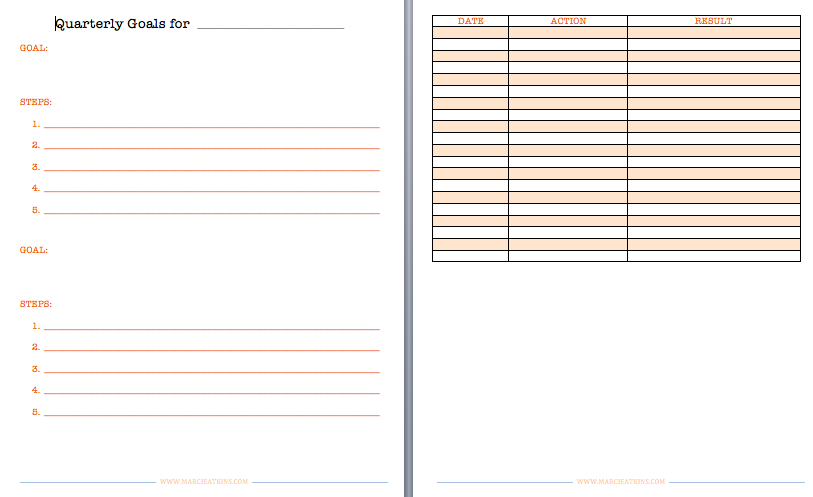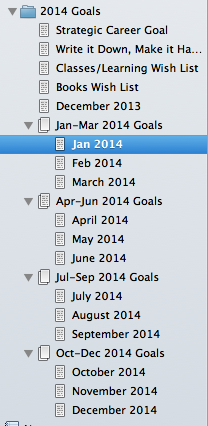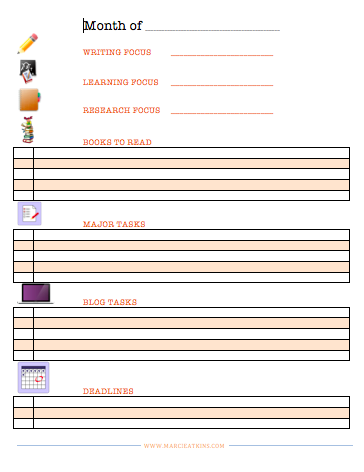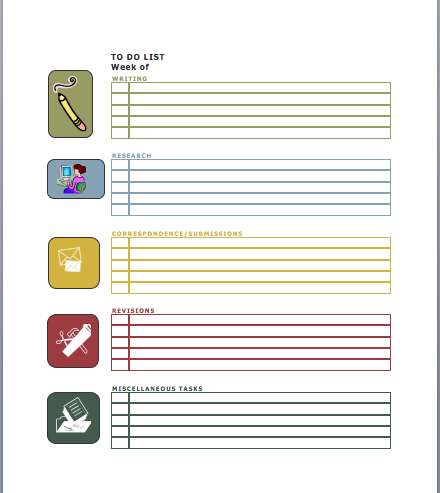I’m an overachiever, so it I find it easy for me to get excited about a lot of different things and pursue them relentlessly. But sometimes I lose my way. Sometimes I feel like an overwhelmed workaholic who has spread herself too thin. But refocusing trims out the unnecessary so you can concentrate fully on the things you really want to do.
Goal making provides a roadmap for your year, but it doesn’t do much good if you lose sight of those goals. Some of you might be like me. If I want to take a cross-country road trip, I would have to be really cognizant of NOT meandering to every single attraction I wanted to see from Virginia to California. I’d never get there. I’d have to pick a few places that were really worth my time.
It’s the same thing with goal-making. In order for me to get from a blank page to a finished book, there are a number of different ways I could get there, but I have to be focused on the one I want to do. As I analyzed why some of my goals from last year were really successful and some were not, I came to the conclusion is that I wasn’t checking in on them often enough. When I got off track and went on a side road, I didn’t come back to my main focus.
Quarterly Goals
In 2014, I developed a plan to stay more focused all year long. I’m breaking my goals down into manageable three-month chunks, or quarterly goals. In three months, you can accomplish some pretty big projects, or at least big parts of those projects. For example, in three months, I can draft a manuscript, research a manuscript, or take a class. If new opportunities present themselves, I can add them to the next quarter’s goal.
I don’t want to be so tied down to goals that I make in December for the next year that I can’t leave room for opportunities that come about—like freelance projects. Sometimes you have to adjust the route. It may not be something you specifically planned for, but it’s worth the trip.
Every three months, I’m going to take a look at my finished goals and create new goals. I put reminders on my calendar for the whole year to make quarterly goals—a reminder at the end of December 2013, March 2014, June 2014, and September 2014.
Each goal is very specific. Some goals might last for the whole year, but each quarter, I will check on my progress.
Monthly Focus
I take these quarterly goals and break them down into a MONTHLY FOCUS page. It’s an at-a-glance view of the big things I need to work on that month in order to accomplish my quarterly goals. The categories I focus on are:
WRITING FOCUS
LEARNING FOCUS
RESEARCH FOCUS
BOOKS TO READ
MAJOR WRITING TASKS
BLOG TASKS
DEADLINES
Wanting to learn new things, read new books, and pursue multiple passions often distracts me. I write in several genres, for several age groups. This can sometimes mean that my focus is also divided. I end up with a jumble of things I know I need to work on, but it’s easy to get overwhelmed, over-committed, and overworked.
I created a Scrivener document to keep track of everything. If I find a class I want to take or a new skill I want to learn, I write it down in my Learning Folder.
I’m also really bad about wanting to read a bunch of craft related books, but in order to really apply what I’m learning, I know I shouldn’t read more than one at a timed. So I make a book wish list as well. As I prepare my monthly focus sheet, I can look to see what was on my wish list.
I place this focus chart behind my computer where I can see it everyday. I try really hard to make sure the big tasks I complete each week stick to these focuses. There is little time wasted wonder what should be done next.
Weekly To-Do List
Each week, usually on Sundays, I take a look at my monthly focus sheet and break down what needs to be done that week in order to accomplish these goals. For example, if my goal this month is to finish the draft of my middle grade novel, then every day that week, I have to write 500 words. That goes on my to-do list.
If I plan out what small things I have to do each day, then I am more focused in the hour I have to write before I go to my day job. One hour doesn’t seem like a lot, but with focus and consistency, it really adds up.
A Sense of Accomplishment
I’m more highly motivated when I see a task I know I can complete. Writing is hard. Thinking about writing a whole book or revising a whole book is overwhelming at times. But if I know that all I have to do is write 500 words today, then I can do it, and I can do it pretty quickly.
I’m motivated by completed tasks.
Plan out an article? I can do that.
Read book X for an upcoming project and take notes? Manageable.
Cut apart a work-in-progress picture book and see how it stacks up structurally? That sounds fun!
Planning my focuses little by little helps me to stop feeling so overwhelmed, overworked, and overcommitted. Having a system for what I want to accomplish helps me pluck my dreams out of the sky and start working on them each day.

Marcie Flinchum Atkins is an elementary school teacher and children’s writer. She got her MA and MFA in children’s literature from Hollins University. She blogs about making time to write and using mentor texts at: https://www.marcieatkins.com











